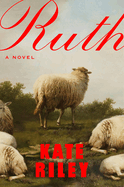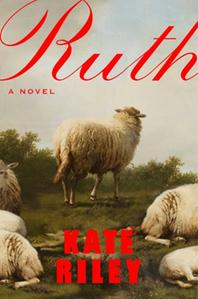
 Kate Riley's debut novel features Ruth, a member of an intentional Anabaptist community, whose fumbling faith and irreverent curiosity will captivate even as she mystifies those seeking tidy conclusions. Readers follow Ruth from her birth and naming in Gracefield, "on the first knuckle of the index finger in the glove of Michigan; the most Southerly of the Brotherhood's three North American Dorfs" through Shalom (the confederation of young single people in the community), marriage, and motherhood within the Dorfs.
Kate Riley's debut novel features Ruth, a member of an intentional Anabaptist community, whose fumbling faith and irreverent curiosity will captivate even as she mystifies those seeking tidy conclusions. Readers follow Ruth from her birth and naming in Gracefield, "on the first knuckle of the index finger in the glove of Michigan; the most Southerly of the Brotherhood's three North American Dorfs" through Shalom (the confederation of young single people in the community), marriage, and motherhood within the Dorfs.
In some ways, Ruth is no different from her sisters in community: tying her kerchief and submitting to Saturday work assignments; requesting baptism and praying for God's will; marrying her husband, Alan, after weeks of written communication guided and edited by the elders, three days of engagement, and a New Year's Day wedding shared with another young couple. But Ruth's voice and her experience in the Brotherhood is singular as she vacillates between wonder, boredom, and despair. She is awed by "how beautiful the world had become. God was the trees and the sky and line where they met" and driven by an intense curiosity "inflamed by deviance," which is tempered by the benevolent patience of the community, tolerant of her many failures to meet expectations. After devoting herself to the morning yogurt, "an object of much magical thought on the Dorf, [which] rivaled fertility as evidence of a sister's worth," Ruth manages to spill the entire vat down the stairs. Discovering this disaster, Martha "took the mop and bucket from Ruth's hands, set them down, and braced Ruth in a hug until the weeping softened." Perhaps it is this gentle acceptance that keeps Ruth enfolded in the Brotherhood, even when its stays tighten uncomfortably around her.
Though countless members, including her eldest, Jamie, leave the community, Ruth remains. When she and Alan meet Jamie for lunch in Chicago, he remarks: "you look happy, Mama." Though she has to pause in a kind of panic before responding, she does finally: "I am, I think." This ambivalence resonates throughout Ruth, capturing the ways a person might spend a lifetime seeking belonging and accepting whatever version is provided. Riley's Ruth is a baffling character at times, especially as she accepts notions of submissive womanhood that defy feminist power. But throughout the novel, Ruth is a force, proving she can be no one but herself--an unlikely adherent, her rebellious heart committing to obedience. --Sara Beth West, freelance reviewer and librarian
Shelf Talker: Living in an intentional community of Anabaptists, Ruth will confound and surprise readers with her questioning spirit and willing submission.

